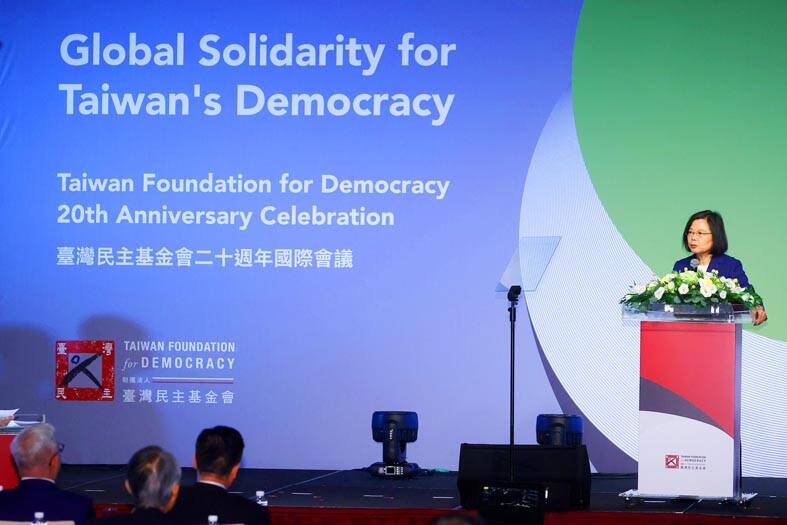Taiwan would confront the destabilizing forces working against democracies while strengthening cooperation with democratic nations, President Tsai Ing-wen (蔡英文) said in Taipei yesterday at an event marking the 20th anniversary of the state-financed Taiwan Foundation for Democracy.
Democratic nations and the rules-based international community are confronting their “greatest challenge” since the Cold War, Tsai said.
Authoritarian regimes are mounting an effort to “corrode our democratic institutions and undermine human rights” in a bid to spread societal distrust and weaken public confidence in democracy, she said.

President Tsai Ing-wen speaks at an event at the Taiwan Foundation for Democracy in Taipei yesterday.
Photo: CNA
Taiwan is familiar with these efforts since the nation has long been exposed to Beijing’s threatening military exercises, economic coercion, cyberattacks and disinformation campaigns, she added.
Taiwanese are unbowed against the challenge of authoritarianism and fight it each day to preserve their democratic way of life, Tsai said, urging the world’s democracies to cooperate against the common threat.
“If we want to meet this challenge, we must work together as democracies to counter the tactics that authoritarian regimes use to undermine our institutions,” she said.
Legislative Speaker You Si-kun (游錫?), who is chairman of the foundation, said Taiwanese must recover their democratic spirit to protect national sovereignty and democratic institutions from the authoritarian onslaught.
The nation did not obtain its vaunted status of being a democratic exemplar as a gift from the heavens, but through the “blood and tears” of democracy pioneers, he said.
The sphere of democracies has receded in a worrying trend over the past decade, with Beijing imposing its National Security Law on Hong Kong and the Russian invasion of Ukraine, You said, adding that democracy is declining globally according to Freedom House’s rankings last year.
The attacks on freedoms by authoritarian regimes and the failure of democratic consolidation are both to blame for the setbacks dealt to democracies across the world, he said.
Taiwan’s democracy is threatened by “military intimidation from the Chinese Communist Party (CCP) externally, coupled with challenges arising from a historical legacy of authoritarian party-state education and cognitive warfare carried out by the CCP within Taiwan,” You said.
A free people with the will to defend themselves is the ultimate foundation of national defense and Taiwan must rediscover its democratic spirit to be truly secure, he said, calling for a global stance for freedom.
You expressed Taiwan’s solidarity with Ukraine, adding that both nations are on the front line of the struggle against authoritarianism and that Taiwanese would also defend universal values with their lives.
US National Endowment for Democracy president Damon Wilson, who presented Tsai with the endowment’s Democracy Service Medal, said China’s bid to coerce Taiwan is “part of a broader global assault on democracy.”
Defending freedom requires a coordinated and focused response from democracies, he said, adding that the world must stand in solidarity with Ukraine in its fight against Russian aggression and Taiwan’s efforts to protect its democracy.
At the same, Taiwanese should be mindful that “democracy is [their] security,” Wilson said.
“As Taiwan deepens its democracy at home, it bolsters its own security,” he said.
Source: Taipei Times - 2023/07/19




















